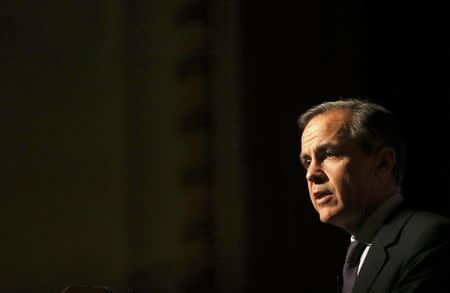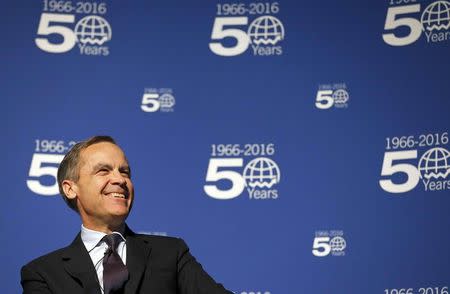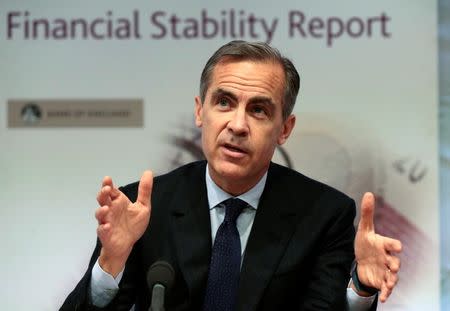BoE's Carney says has no timetable for raising record-low UK rates
By David Milliken and Ana Nicolaci da Costa LONDON - Bank of England Governor Mark Carney said on Tuesday he had no timetable for raising interest rates and avoided giving one of his trademark steers on what was likely to happen to them against a backdrop of a weakening global economy. With Chinese growth hitting a 25-year low and British pay increases slowing, Carney's first speech of 2016 strengthened the view among economists that the central bank is unlikely to raise rates until the second half of this year at the earliest. "The journey to monetary policy normalisation is still young," he told students at the University of London. "(It) doesn't have a set timetable, only an expected direction of travel." Britain has grown more strongly than almost all its peers among rich economies over the past two years. Last summer Carney said a decision on when to start raising rates would probably become clear by about now, his latest attempt to bring more predictability to monetary policy. But since then, the mood at the BoE has turned much more cautious and plunging oil prices have kept inflation close to zero, way below the Bank's 2 percent target. "The year has turned, and, in my view, the decision proved straightforward - now is not yet the time to raise interest rates," Carney said, referring to his forecast of July. Investors expect no hike until 2017 while economists think one will happen in the second half of this year. Sterling fell to a seven-year low against the dollar after Carney's comments. "The (Carney) speech was obviously very, very dovish and we have touched the long term lows as a result," said Thomas Suter, chief executive of currency focussed Swiss hedge fund Quaesta. Carney was encouraged to use his so-called forward guidance by British finance minister George Osborne when he took over the BoE in 2013, when Britain's economy was emerging from stagnation. Carney said then he would not even think about raising rates until Britain's unemployment fell below 7 percent. But that happened far more quickly than the Bank expected and too soon for it to consider a rate hike. Then, in 2014, Carney said rates could go up sooner than markets expected, only for oil prices to slide, generating global fears about deflation and tying the BoE's hands. BNP Paribas economist Dominic Bryant said the time for giving forward guidance had passed and it was unrealistic for Carney to give a precise steer on when rates would rise. "Forward guidance may have been a useful tool a few years back, when all it was used to say was that policy would remain very accommodative for a long period. But it has its limitations when you come to exit the zero interest rate environment because that is going to be sensitive to the data." GROWTH AND INFLATION On Tuesday, Carney listed three factors he would be focussing on but avoided giving specific threshold levels. Britain's economy would need to grow faster than average for a move on rates, he said, in contrast to signs that growth slowed to below its long-run average in the second half of 2015. Underlying price pressures - chiefly wage growth - would need to pick up and core inflation would need to be "moving notably towards the target". British inflation data on Tuesday showed prices were flat in 2015, the lowest reading since comparable records began in 1950. Core inflation - excluding volatile oil prices - rose more than expected to 1.4 percent in December, its highest since January 2015, but remained well below the BoE's 2 percent target for headline inflation. Earlier on Tuesday, the International Monetary Fund's chief economist said he expected the BoE to wait for strong evidence of faster wage growth before raising rates. Only one of the BoE's nine policymakers has voted for a rate hike in recent months. On Monday, Gertjan Vlieghe, its newest rate-setter, said he might vote for a cut if bad news piled up. Carney said British demand would probably remain strong but China and other emerging economies posed risks. He said Britain's comparatively high exposure to the weakness of the world economy was one reason why the BoE was not following the U.S. Federal Reserve which last month increased rates for the first time in nearly a decade. British wage growth has been weaker than he expected - and below the 3 percent level Carney had previously identified as propitious for a rate hike. On Tuesday he said the level of unemployment which would trigger higher inflation might be lower than the BoE's current 5 percent estimate. The BoE would also watch for signs that low inflation was getting entrenched by less generous wage deals. (Writing by William Schomberg; Editing by Janet Lawrence)




